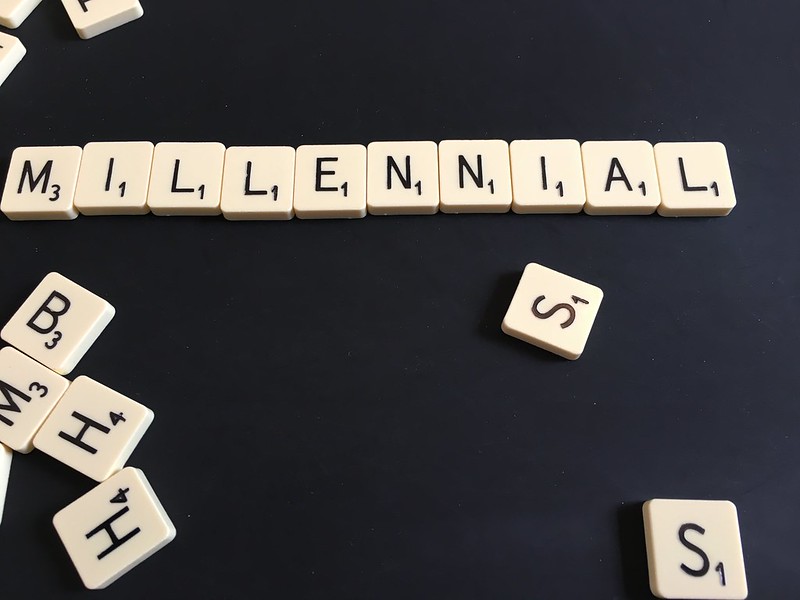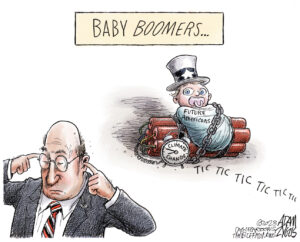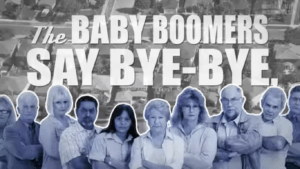Is There Anything the Media Won’t Blame on Millennials?
Debate surrounding the cheeky meme "OK Boomer" offers just another form of distraction from the class divide tearing our country apart. Jeff Djevdet / Flickr
Jeff Djevdet / Flickr
In recent times, media have taken a great interest in highlighting and even generating intergenerational fighting. One example is the focus on the “OK boomer” meme, a witty two-word comeback gaining popularity on the internet. “OK boomer” is a pithy, cutting retort millennials (those born between 1981–96) and Generation Z (those “Zoomers” born even later than 1996) give to those born during the baby boom (1946–64). The digital equivalent of an eye roll, it conveys that the speaker considers the person being addressed to be obtuse, stubborn and out of date.
Though it’s today’s youth who are frequently claimed to constitute “Generation Snowflake,” the phrase appears to seriously annoy many, well, boomers, and has generated a great deal of media takes, eager to exploit the meme while it is still fresh (e.g., Today, 10/30/19; NBC News, 11/7/19; NPR, 11/7/19; CNN, 11/8/19). Writing a long self-own in the New York Times (11/2/19), Maureen Dowd described her annoyance at junior colleagues “OK boomer”-ing her to display contempt. The Chicago Tribune’s Heidi Stevens claimed (11/4/19) the formerly fun phrase had turned nasty, and we had collectively killed it. Meanwhile, one Miami Herald columnist (11/5/19) exhorted his fellow oldies with “Get Over It, Boomers! Gen Z Hates Us–That’s the Natural Order of Things.”
But conservative upstate New York radio show host Bob Lonsberry provided undoubtedly the hottest take of all, claiming that “boomer” had become “the n-word of ageism,” suggesting that this sort of “bigotry” towards the older generation had become “acceptable.” He later deleted his comment after receiving a torrent of ridicule. Lonsberry had previously been fired from his job at Rochester, N.Y.’s WHAM radio for referring to local African-American mayor William Johnson as a “monkey.”
The Washington Post (11/4/19) and the New York Times (10/29/19) attempted to describe the meaning behind the new phrase. For the Post, it “encapsulates an increasingly evident divide between Generation Z, millennials and their older counterparts” who “they perceive as out of touch.”
The Times claimed it “marks the end of friendly generational relations,” interviewing some of the young people who helped popularize the phrase, noting the teens “believe older people are actively hurting young people” through the ending of affordable college tuition and their failure to act on climate change.
It quotes one Zoomer:
Everybody in Gen Z is affected by the choices of the boomers, that they made and are still making.…Those choices are hurting us and our future. Everyone in my generation can relate to that experience and we’re all really frustrated by it.
While providing a range of takes, what all these stories obscure, with their focus on intergenerational strife, is the relevance of class as a fundamental divide in American culture. In reality, it was not boomers as a group who prevented meaningful action on climate change, nor was it they who increased college tuitions (FAIR.org, 4/5/17). Those decisions were made by a small group of people at the top of society–in corporate boardrooms and in high office. There is much to be said about how the media’s not-hot-but-perennial takes hide such decisions by pitting generations against one another (Extra!, 3–4/97)–with assertions that Social Security recipients are stealing from the young, and that slashing government budgets is a matter of generational equity.
But the current generational conflict narrative mainly serves to obscure the vast differences in wealth and power between those in the same age cohort. While the current generation is far worse off economically than previous ones, the National Council on Ageing notes that over 25 million Americans aged 60+ are economically insecure, with over a third of senior households broke or in debt at the end of the month. Therefore, by emphasizing age and not class, corporate media are effectively playing generations off against each other, allowing the rich to play divide and rule (FAIR.org, 1/5/16).
This is exactly what USA Today (11/7/19) did in its story about lack of career advancement among younger workers, headlined, “Millennials, Gen Xers to Baby Boomers: Can You Retire So I Can Get a Job Promotion?” This framed the issue as a fight between disgruntled young people angry at an older generation who refuse to retire, rather than one about the inherent structural inequalities of capitalism that inevitably leave the majority in subordinate positions, while failing to provide a social safety net sufficient to allow the elderly to stop working.
Millennials Are Killing Everything
The discussion of the new boomer meme takes the place of–while of a piece with–complaints that millennials are ruining everything (FAIR.org, 10/10/16). One of the many things the young are destroying is the housing market, according to a host of articles. Business Insider (7/30/19) insists that the reason young people are not buying homes is not the out-of-control market, but because they “prefer to rent instead.” And if they do buy, they “don’t want” boomers’ large properties, “preferring smaller houses” (Business Insider, 3/28/19). The smaller the better!
Going further, the Daily Telegraph (3/29/19) claimed that young people don’t like possessing anything whatsoever, arguing the “sharing economy” is great, “allowing millennials to enjoy the benefits of owning” without the “bother” of buying, quoting one source who claimed “ownership nowadays just doesn’t have the glory it used to.” Quartz (8/27/19) claimed this shift had resulted in a new housing model in which the “customer” (i.e., the renter)—not the landlord—is king.” Given that high rents and house prices, crippling student debt and a faltering economy has resulted in nearly a quarter of those under 37 forced to live with their parents, that claim appears debateable.
And that is the problem. This genre of articles ignores, downplays or specifically argues against the idea that young people are often huge losers in the post-crash economy, and many have little to no hope of ever affording a home. But instead of discussing these structural factors, media instead prefer to explain the phenomenon as one of personal choice.
Sometimes, corporate media will blame the young for their own predicament. Picking up on a New York Times article (2/22/16), a very wide range of outlets, including Fox Business (2/25/16), CBC (2/25/16), Business Insider (2/25/16), the Daily Mail (2/25/16) and the Cut (2/26/16) all claimed that millennials were simply too lazy to eat cereal, thus crippling the industry.
A more likely reason for cereal’s poor performance with younger adults is alluded to in the Washington Post (2/23/16): Millennials are so overworked and time-pressed that they have forgone formal meals, instead eating and drinking on the go. Any of these articles could have used the news as a hook to explore the increasingly difficult structural and economic circumstances workers are under. But instead it was used to frame the young as feckless loafers, in a similar manner to how the poor are blamed for their own condition.
The New York Post got more than it bargained for when it published an article (10/26/19) complaining that millennials had killed the power lunch. Emily Kirkpatrick, a millennial Post employee, offered via Twitter (10/30/19) some alternative, undiscussed reasons why her generation might be abstaining from afternoon dining in Manhattan’s top restaurants. She noted that the Post does not provide its staff with lunch hours and that they are expected to be at their desks all the time, “so if you want to blame someone for killing the power lunch,” she said, “you might want to take a look in the mirror first.”
Dividing people by age rather than class has an intrinsic appeal to corporate media outlets owned by the wealthy elite of this country. While there are certainly genuine divides along age lines in Western society, they are all too often promoted in lieu of discussing more relevant class divides, effectively pitting the generations off against one another, leaving those responsible for the current mess laughing all the way to the bank.
Your support matters…Independent journalism is under threat and overshadowed by heavily funded mainstream media.
You can help level the playing field. Become a member.
Your tax-deductible contribution keeps us digging beneath the headlines to give you thought-provoking, investigative reporting and analysis that unearths what's really happening- without compromise.
Give today to support our courageous, independent journalists.





You need to be a supporter to comment.
There are currently no responses to this article.
Be the first to respond.